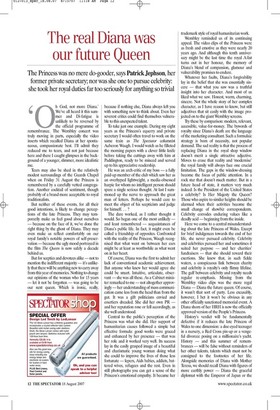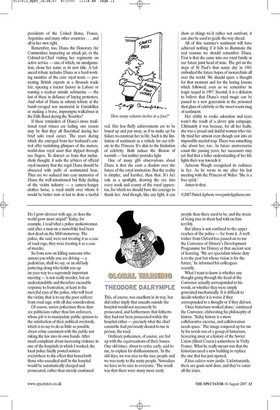The real Diana was our future Queen
The Princess was no mere do-gooder, says Patrick Jephson, her former private secretary; nor was she one to pursue celebrity: she took her royal duties far too seriously for anything so trivial h God, not more Diana.' We've all heard it this summer and Di-fatigue is unlikely to be reversed by the official programme of remembrance. The Wembley concert was truly moving in parts, especially the video inserts which recalled Diana at her spontaneous, compassionate best. I'll admit they reduced me to tears, and not just because here and there I caught glimpses in the background of a younger, slimmer, more idealistic me.
Tears may also be shed in the relatively modest surroundings of the Guards Chapel when on Friday 31 August the Princess is remembered by a carefully vetted congregation. Another cocktail of sentiment, though probably of a brand more acceptable to royal traditionalists.
But neither of these events, for all their good intentions, is likely to change perceptions of the late Princess. They may temporarily make us feel good about ourselves — because on the face of it, we've done the right thing by the ghost of Diana. They may even make us reflect comfortably on our royal family's notable powers of self-preservation — because the ugly mood portrayed in the film The Queen is now safely a decade behind us.
But for sceptics and devotees alike — not to mention the indifferent majority — it's unlikely that there will be anything new to carry away from this year of memories. Nothing to change our opinions of the woman who for 15 years — let it not be forgotten — was going to be our next queen. Which is ironic, really, because if nothing else, Diana always left you with something new to think about. Even her severest critics could find themselves vulnerable to this unexpected talent.
To take just one example. During my eight years as the Princess's equerry and private secretary I would often travel to work on the same train as The Spectator columnist Auberon Waugh. I would watch as he filleted the morning papers with a clever little knife before taking the cuttings away with him at Paddington, ready to be minced and served up to his appreciative readership.
He was an arch-critic of my boss — a fully paid-up member of the club which saw her as an overhyped lightweight, a media-obsessed harpie for whom no intelligent person should spare a single serious thought. At last I summoned up the nerve to approach the great man of letters. Perhaps he would care to meet the object of his scepticism and judge for himself 9 The dare worked, as I rather thought it would. So began one of the most unlikely — and least remembered — acquaintances of Diana's public life. In fact, it might even be called a friendship of opposites. Confronted with the reality of the Princess, Waugh recognised that what went on between her ears might be at least as worthwhile as what went on in her heart.
Of course, Diana was the first to admit her lack of conventional academic achievement. But anyone who knew her would agree she could be smart. Intuitive, articulate, observant — she was all these. As a Cabinet minister remarked to me — not altogether approvingly — her understanding of mass communication came less from the head than from the gut. It was a gift politicians envied and courtiers dreaded. She did her own PR — and her reputation rose or fell accordingly, as she well understood.
Central to the public's perception of the Princess was what she did. Her support of humanitarian causes followed a simple but effective formula: good works were graced and enhanced by her presence — that was her role and it worked very well. Its success lay in the easily grasped image of a beautiful and charismatic young woman doing what she could to improve the lives of those less fortunate — lepers, Aids babies, addicts, battered wives, refugees and the rest. Even in still photographs you can get a sense of the Princess's emotional empathy. It became her trademark style of royal humanitarian work.
Wembley reminded us of its continuing appeal. The video clips of the Princess were as fresh and emotive as they were nearly 20 years ago. And although this tenth anniversary might be the last time the royal A-list turns out in her honour, the memory of Diana's blend of compassion, glamour and vulnerability promises to endure.
Whatever her faults, Diana's forgivability lay in the belief that she was essentially sincere — that what you saw was a truthful insight into her character. And most of us liked what we saw. Honest, warm, charming, sincere. Not the whole story of her complex character, as I have reason to know, but still adjectives that sit easily with the image projected on to the giant Wembley screens.
Try these by comparison: modern, relevant, accessible, value-for-money. The bywords of royalty since Diana's death are the language of the marketing consultant. Such a formulaic strategy is born of necessity, not popular demand. The sad reality is that the process of replacing Diana in the royal shop window doesn't merit a single attractive adjective. Moves to erase that reality and 'modernise' the royal family will always face one crucial limitation. The gaps in the window-dressing become the focus of public attention. In a rock star that doesn't much matter. But in a future head of state, it matters very much indeed. Is the President of the United States a celebrity? Is Her Majesty the Queen? Those who aspire to similar heights should be alarmed when their activities become the small change of showbiz correspondents. Celebrity corrodes enduring values like a deadly acid — beginning from the inside.
Here we come to a central misunderstanding about the late Princess of Wales. Except for brief indulgences towards the end of her life, she never pursued celebrity. Celebrity and celebrities pursued her and sometimes it suited her purpose — and her charities' fundraisers — that she should reward their exertions. She knew that, in such fickle waters, a conspicuous link between charity and celebrity is royalty's only flimsy lifeline. The gulf between celebrity and royalty needs regular re-emphasis. Missing from the Wembley video clips was the more regal Diana — Diana the future queen. Of course, it wasn't that sort of party. Less excusably, however, I bet it won't be obvious in any other officially sanctioned memorial event. A Diana shorn of her HRH is now the officially approved version of the People's Princess.
History's verdict will be fundamentally defective if it reduces the late Princess of Wales to one dimension: a doe-eyed teenager in a nursery, a Red Cross pin-up or a vengeful divorcee posing on a millionaire's yacht. History — and this summer of remembrances — will be false without reminders of her other talents, talents which must not be consigned to the footnotes of her life. Alongside memories of Diana with Mother Teresa, we should recall Diana with figures of more earthly power — Diana the graceful diplomat with the Emperor of Japan or the presidents of the United States, France, Argentina and many other countries . . . and all in her own right.
Remember, too, Diana the Honorary Air Commodore inspecting an attack jet, or the Colonel-in-Chief visiting her regiments on active service — one of which, on amalgamation, chose her name as its new title. A balanced tribute includes Diana as a hard-working member of the core royal team — promoting British exports at a Brussels trade fair, opening a tractor factory in Lahore or naming a nuclear missile submarine — the last of these in defiance of baying protesters. And what of Diana in solemn tribute at the bomb-ravaged war memorial in Enniskillen or making a brave, impromptu walkabout in the Falls Road during the Troubles?
If these reminders of Diana's more traditional royal virtues are fading, one reason may be that they all flourished during her brief solo royal career. The years during which she emerged from her husband's control offer tantalising glimpses of the mature, world-class royal asset that slipped through our fingers. To distract us from that melancholy thought, it suits the arbiters of official royal memory that the regal Diana should be obscured with puffs of sentimental haze. Thus are we seduced into easy memories of Diana the well-intentioned but flaky darling of the victim industry — a camera-hungry clothes horse, a royal misfit over whom it would be better now at last to draw a tactful veil. Her less fluffy achievements are to be boxed up and put away, as if to make up for failure to constrain her in life. Such is the limitation of sentiment as a vehicle for our tribute to the Princess. It's akin to the limitation of celebrity. Both induce the illusion of warmth — but neither provides light.
One of many glib observations about Diana is that she casts a shadow over the future of the royal institution. But the reality is simpler, and harsher, than that. It's her role as a spotlight, drawing the eye into every nook and cranny of the royal apparatus, for which we should have the courage to thank her. And though, like any light, it can show us things we'd rather not confront, it can also be used to guide the way ahead.
All of this summer's sentiment will have achieved nothing if it fails to illuminate the real reasons we should remember Diana. First is that she came into our royal family as our future joint head of state. The girl on the steps of St Paul's that sunny day in 1981 embodied the future hopes of monarchists all over the world. We should spare a thought for that moment and for the lasting lessons which followed, even as we remember its tragic sequel in 1997. Second, it is a delusion to believe that Diana's royal magic can be passed to a new generation in the poisoned shot-glass of celebrity or the sweet warm mug of sentiment.
Her ability to evoke adoration and tears wasn't the result of a clever spin campaign. Ultimately it was because, for all her faults, she was a proud and dutiful woman who visibly tried her utmost even though cast into an impossible marital trap. There was something else about her, too. As future anniversaries count the passing years, her successors may yet find that a fuller understanding of her life lights their way towards it.
Auberon Waugh recognised its radiance in her. As he wrote to me after his last meeting with the Princess of Wales: 'She is a free spirit.'
Amen to that.
02007 PairickJephson;www.pairickjephsoncom.













































 Previous page
Previous page